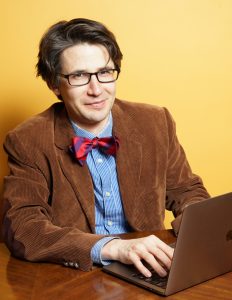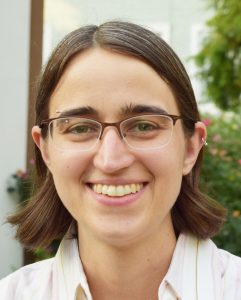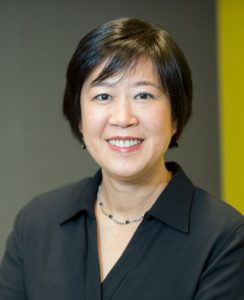Their method for introducing machine learning in chemistry classes has been honored with the inaugural James C. McGroddy Award for Innovation in Education, named for a donor who funded the award’s cash prize. (See related story.)
The recipients are Elizabeth Thrall, Ph.D., assistant professor of chemistry; Yijun Zhao, Ph.D., assistant professor of computer and information science; and Joshua Schrier, Ph.D., the Kim B. and Stephen E. Bepler Chair in Chemistry. They will share the $10,000 prize, awarded in April.
Chemistry and Computation Come Together
The three awardees’ project shows how to reduce the barriers to learning about programming and computation by integrating them into chemistry lessons. The project came together during the COVID pandemic—since chemistry students were working from their computers, far from the labs on campus, it made sense to give them some computational projects, in addition to experiments they could conduct at home, Thrall said.

Because little had been published about teaching machine learning to chemistry students, she got together with Schrier and Zhao to design an activity. Zhao, director of the Master of Science in Data Science program at Fordham, involved a student in the program, Seung Eun Lee, GSAS ’22, who had studied chemistry as an undergraduate.
Their first classroom project—published in the Journal of Chemical Education in 2021—involves vibrational spectroscopy, used to identify the chemical properties of something by shining a light on it and recording which wavelengths it absorbs. Students built models that analyzed the resulting data and “learned” the features of different molecular structures, automating a process that they had learned in an earlier course.

For another project, the professors taught students about machine-learning tools for identifying possible hypotheses about collections of molecules. Machine learning lets the students winnow down the molecular data and, in Schrier’s words, “make that big haystack into a smaller haystack” that is easier for a scientist to manage. The professors designed the project with help from Fernando Martinez, GSAS ’23, and Thomas Egg, FCRH ’23, and Thrall presented it at an American Chemical Society meeting in the spring.
Thumbs-Up from Students
How did students react to the machine learning lessons? According to a survey following the first project, 63% enjoyed applying machine learning, and 74% wanted to learn more about it.
“I think that students recognize that these are useful skills … that are only going to become more important throughout their lives,” Thrall said. Schrier noted that students have helped develop additional machine learning exercises in chemistry over the past two years.
Machine Learning in Education and Medicine

Zhao noted the growing applications of machine learning and data science. She has applied them to other fields through collaborations with Fordham’s Graduate School of Education and the medical schools at New York University and Harvard, among other entities.
The McGroddy Award came as a surprise. “I don’t think that we expected to win,” Schrier said, “just because there’s so many other excellent pedagogical innovations throughout Fordham.”
Eva Badowska, Ph.D., dean of the Faculty of Arts and Sciences at the time the award was granted, said the professors’ “path-breaking interdisciplinary work has transformed lab courses in chemistry.”
There were 20 nominations, and faculty members reviewing them “were humbled by the creativity, innovation, and generative energy of the faculty’s pedagogical work,” she said.
In addition to the McGroddy Award, the Office of the Dean of Faculty of Arts and Sciences is providing two $1,000 honorable mention prizes recognizing the pedagogy of Samir Haddad, Ph.D., and Stephen Holler, Ph.D., associate professors of philosophy and physics, respectively.


